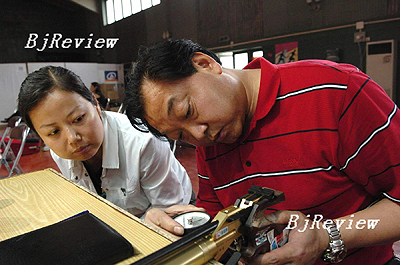
July 30, 1984 is a day written into China's Olympic history. Since the first modern Olympic Games were initiated in 1896, around 2,500 gold medals have been won by athletes from across the globe who were faster, stronger and more agile than their competitors, but none of them had gone to a Chinese athlete until that day. The Chinese people had waited 88 years and they waited 16 minutes more that July summer's day.
Sixteen minutes before the end of the 50-meter pistol competition, the first event of the 23rd Olympics in Los Angles, Xu Haifeng pulled the trigger to release his breathtaking last shot in the competition. Xu's shot saw him triumph in the event and won him the first-ever Olympic gold medal for China.
Prior to his trip to the United States to compete as a first-time Olympian, Xu could never have imagined he would walk away from those Olympics a champion and national hero. Despite his childhood dream of becoming a sharpshooter and consistent self-training, he had received only two years of professional sports training, during which he had to return to his job as a sales clerk in a rural shop for three months.
Until today, the champion shooter, who donated his precious gold medal to the National Museum of China one month later, still believes he was favored by luck to achieve such a feat. "I was simply lucky since the event I competed in was the first event of those Olympics," said Xu. China grabbed a total of 15 gold medals at the Los Angles Olympics that year.
Xu, who later in his career won several world champion titles, retired from his shooting career at the end of 1994 and became the head coach of the women's shooting team. Ever since he claimed the first Olympic gold medal for the country expectations have been high for the national shooting team to win China's first gold medal during each Games, as it is an event that takes place during the preliminary stages.
"A good beginning greatly boosts morale for other national teams at the Olympics. Because of this our shooting squad usually has the self-imposed task of winning a gold medal in one of its events," said Xu, who faced these expectations many times as the head coach of China's shooting team.
"I had the most stressing days as the head coach. Before me our shooting team grabbed gold medals at almost every Olympics. I didn't want to see poorer showings when I headed the team," said Xu.
Prior to each Olympic Games more than 100 potential Olympic shooters would join a training camp at which Xu would oversee daily training, diet and rest. His regime paid off at the Atlanta Olympic Games in 1996 when Li Duihong won a gold medal in the 25-meter sport pistol competition for women. "Li is a talented shooter and I just needed to refine her skills a little bit," said Xu.
At the 2000 Sydney Olympic Games, another disciple of Xu, Tao Luna, won the gold medal in the air pistol event, becoming the first Chinese athlete decorated with a gold medal at Sydney.
However, these achievements were not made without costs. According to Xu, since he became the head coach for the national shooting team in 2001, his hair has begun thinning and turned almost white. "I also suffered from high blood pressure, worrying all day that something might go wrong with such a big team," he said.
At the Athens Olympic Games in 2004, the Chinese shooting team pocketed four gold medals, the best ever record for a Chinese Olympic team. After returning from Athens, Xu was appointed as head official for the modern pentathlon by the General Administration of Sport of China.
The modern pentathlon has been dominated by European athletes since it became an Olympic event in 1912. China did not have a national modern pentathlon team until 1984. As a sport yet to be popularized, less than 10 provinces in China have modern pentathlon athletes totaling less than 120. Until 2004, China's best performance in this event was fourth place at the World Championships.
Xu said the first thing he did as coach was to instill self-confidence in his team. At the 2005 World Modern Pentathlon Championship held in Warsaw, China's ace Qian Zhenhua became the first Asian athlete to become world champion in the event. "This was also the first world champion crown for an athlete from outside of Europe," said Xu proudly.
At the Tokyo Asian Championships in May, the first Olympic qualifier for Beijing 2008, the Chinese modern pentathlon team won four Olympic tickets. "Our first step has been taken toward the Beijing Olympic Games," Xu said. | 